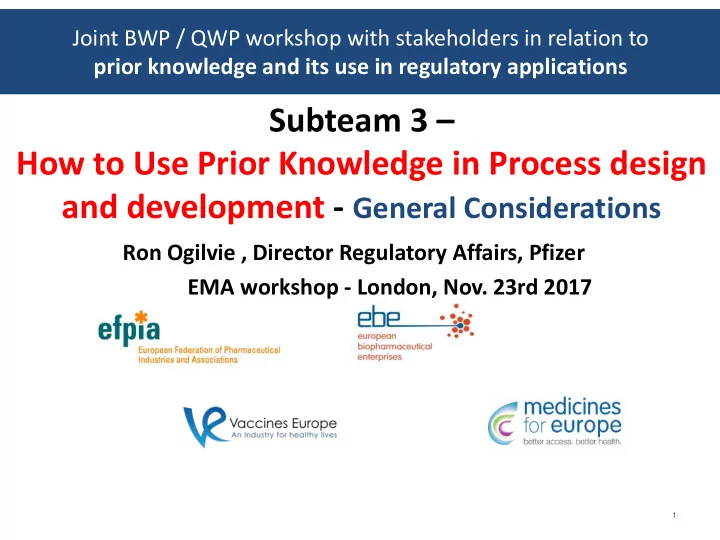

Joint BWP / QWP workshop with stakeholders in relation to prior knowledge and its use in regulatory applications Subteam 3 – How to Use Prior Knowledge in Process design and development - General Considerations Ron Ogilvie , Director Regulatory Affairs, Pfizer EMA workshop - London, Nov. 23rd 2017 1
Process Development Session Outline Part I (25 min) • Regulators Viewpoint (Dr. Sean Barry)-15min • General Considerations, including small molecules considerations -10min Part II (30 min) 3 Case Studies: 10 min each • Prior Knowledge to optimize process characterization approaches, mAb (Amgen) • Prior knowledge to optimize process validation approaches , mAb (Roche) • Prior knowledge to streamline viral safety and resin lifetime studies (mAb and vaccine, EBE viral safety consortium & MSD) Part III (30 min) Q&A linked to case studies – 10 min General Q&A and discussion – 20 min
Use of Prior Knowledge to Support Manufacturing Process Design and Development Technical Literature • Prior knowledge is widely used in design and Applied Manufacturing development of the manufacturing process for small Experience Platform knowledge molecule and bios entities – Prior knowledge of common DS and DP manufacturing operations and equipment – Underlying science e.g. of API chemical processes Common Scientific & – kinetics etc. Engineering Principles • Development ‘risk assessments’ use prior knowledge and multi-disciplinary experience to inform experimental approach . Although prior knowledge is a dynamic concept, developers and assessors need to share a consistent, scientific understanding of the available prior knowledge in order to facilitate the development of products and the full implementation of ICH Q8-12 3
Knowledge from a variety of sources can be applied to support Process Design and Development • General Scientific knowledge, engineering principles and published literature Scientific Literature • Improve & harmonize processes – SME knowledge • Design & execute workplan (LCM & Projects) and Common performance dashboard product and platform knowledge • Common “understood” CQAs and CPPs for similar product/Process • Equipment and engineering knowledge Company • Modeling and simulation product and platform • experience Data from Product Design and selection • Early Process Design studies • Small scale and Clinical manufacturing • Modeling and simulation • Prior knowledge from similar product/platform • Process characterization 4 4 B. Turner, Leveraging Prior Knowledge in Process Parameter Risk Assessments
General Considerations – Prior Knowledge & Process Development How knowledge and control approaches impact on process validation - Whilst ICH Q8(R2) recognizes that the level of knowledge gained and not the volume of data provides the basis for science-based submissions and flexible regulatory approaches, … the accumulation of prior knowledge, innovative technologies and platform process raise the need for a common understanding of the level of demonstration that is required. 5
Prior Knowledge in Small Molecule Process Design (DS) Use of prior knowledge to design in chemical quality from the manufacturing process • Exploit chemical knowledge to select route and process (efficiency, safety, environmental) • Design of conditions and isolations to control side-reactions/degradation/ incompatibilities • Prediction of GTI risks and their purge* • Structural diversity can mask that underlying science is well known / predictable (mechanism and kinetics) Use of prior knowledge to design in physical properties • BCS class/bioavailability, polymorphism (predicting) and the Drug Product dosage form complexity • Processes can be designed to control crystallisation kinetics – and hence the solid state, particle shape and size • Prior knowledge / modelling used to understand particle size requirements and milling, conditions Source : LHASA Mirabilis ref – consortium accumulation of knowledge 6
Prior Knowledge in Small Molecule Process Development (DP) Use of prior knowledge in manufacturing process development (platform knowledge) • Platform understanding of similar products (types of dosage form, properties of excipients, API characteristics) manufactured using similar processes and equipment – Granulation, drying compression, coating - prediction of scale up etc • Greater consistency in process and control strategy for continuous platform tablet manufacturing process Use of prior knowledge to determine validation approaches • Experience with selected manufacturing processes and equipment • Link number of batches for validation with prior knowledge and manufacturing experience (small scale, development studies) 7
Prior Knowledge in Small Molecule Manufacturing + Lifecycle Management Use of prior knowledge (engineering principles) to inform changes to scale & equipment • Modelling of chemical reaction and mass transfer kinetics – prediction of scale up risks for certain reactions (heterogeneous, biphasic, hydrogenation) and scale up parameters • Definition of the control strategy through scale dependent (e.g. ) and independent (e.g.) parameters and controls • Engineering understanding of scale-up drug product manufacturing processes - flow, blending, compression etc Use of prior knowledge in life cycle management of changes • Understand and model changes to the process conditions (parameters, input material attributes) • Determination of the assessment strategy for implementation of changes (what to test and what to model). • Prior knowledge to manage stability evaluation of a changed product – inc. predictive packaging science • Use prior knowledge to manage change of analytical methods (e.g. critical method operating parameters) • A PACMP is an example of use of prior knowledge r knowledge to determine validation approaches 8
Summary: Use of Prior Knowledge in Process Design and Development • Prior knowledge is widespread in small and large molecules development, for DS&DP • Less experimentation to support process design and development may be appropriate when working in a well-understood and well-precedented areas • Optimal use of platform and prior knowledge is of benefit to applicants and stakeholders – Rapid, efficient, consistent and science based approach to medicines development – Applicability of prior knowledge to product specific case needs to be justified • Prior knowledge can be leveraged together with small scale manufacturing experience to optimise approaches to validation and post-approval change • Developers and regulators need assured scientific understanding and sharing of available prior knowledge in order to facilitate development and maintenance of products 9
Recommend
More recommend